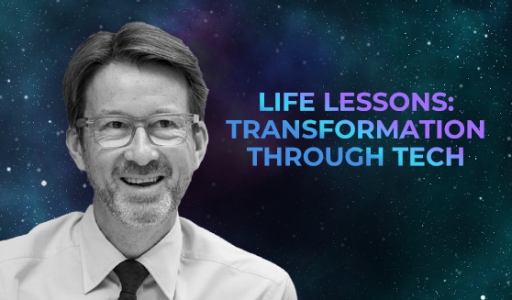
Is GenAI the key to building smarter cities?
Learn how generative AI is unlocking the true potential of digital twins – to make smart cities more efficient, inclusive, and citizen-focused.


“If you look backwards over the last thirty years, technology — both consumer technology and enterprise technology — has been a powerful force for good.”
#LEAP22 was a milestone gathering for the global technology community. But, as Lord Stephen Carter (Group CEO of Informa) put it, “to create these events is not the work of a moment.”
Instead, LEAP has been a long time coming. The event took place in 2022 because of the years of collective experience shared by the LEAP team and all contributors. Experience of working in tech, of witnessing transformation, and of understanding the huge potential for good that developing technologies can unlock.
Carter described how he’s been working in and around tech for about 35 years. He was involved in the development of Ofcom (the world’s first integrated technology and content regulator) in the UK, and went on to write a digital plan for the future of the United Kingdom. He joined Informa in 2010 — and here he’s been able to weave his eclectic tech experiences into LEAP.
Working in tech, he said, has “been a lifelong lesson in humility. Humility about the speed of the possibility of change. There have been many steps that I have had the good fortune to see as the technology industry has unleashed its capability on our daily lives.”
“And it was that power, the power to transform, that was really behind the vision that led us to a partnership with the Ministry of Communications and Technology here in the Kingdom, and also with the Saudi Federation for Cybersecurity.”
Respect for the transformative power of tech grows alongside an awareness that partnerships, community, and gathering together are essential to drive that transformation, and to ensure that technology is being developed for the greatest possible good.
“I was at the first Mobile World Congress, many many years ago,” Carter noted, and “there are many examples around the world, in our portfolio and elsewhere, where the technology industry, the community comes together — normally because somebody somewhere has the vision to see that change will be accelerated by that moment of gathering together.”
That first Mobile World Congress that Carter mentioned took place in 1987 with just a few hundred attendees. In 2022, the event hosted 61,000 in-person attendees. Just weeks earlier, LEAP22 welcomed over 100,000 registered attendees. And we see this as testament to the global tech community’s passion, enthusiasm, and hope. There’s an understanding that change is coming (that change is already well underway, in fact). And that if we come together as a community, invest in partnerships to develop the most exciting ideas and services, and listen to one another, then the future can be transformed — in an overwhelmingly positive way — through technology.
Of course, profitability and ROI are also central factors in the investments and partnerships that have been catalysed by LEAP; it’d be disingenuous to claim otherwise. But something we’ve learnt from every contributor and keynote speaker is that just as tech is made by humans, humans are changed by tech: there’s a personal transformation that happens alongside the experience of learning about, and working with, technology.
Looking back can reveal some of the incredible social changes that have been enabled by technology, and give us the confidence to allow ourselves — as individual human beings — to transform with the tech of today.
“I’m fond of saying that life genuinely can only really be understood backwards,” Carter said, “but you have to live life looking forwards. If you look backwards over the last thirty years, technology — both consumer technology and enterprise technology — has been a powerful force for good. Connectivity has been a powerful force for good. Applications in education, in healthcare, in entertainment, in media, have been a powerful force for democratisation, for liberation, for transparency.”
Importantly, he added, “We may feel uncomfortable at times with some of the transparency, but that transparency shines a light on things that require us to justify, rather than merely to defend.”
The digital tech of 2022 is confronting us (people, generally) with its need for data transparency. With its capacity for the open sharing of information. From an enterprise perspective, business leaders are being confronted with increasing demands for transparency from consumers, governments, and B2B partners. But digital transparency isn’t only a commercial tool or a privacy threat; it’s also a reflection of the human desire for honesty and open communication.
Tech is made by humans, but it’s also asking humans to change. If we want technology to transform our world for the better, we have to be willing to go through some personal transformation too: to embrace community, to own our actions in a way that makes us proud to wear them transparently on our sleeves, and to invest in cooperation over competition.

Learn how generative AI is unlocking the true potential of digital twins – to make smart cities more efficient, inclusive, and citizen-focused.

The smart cities of the future will use tech to lower emissions, cut urban temperatures, and improve quality of life in highly populated areas.

Discover the cities that rank highly for smart city preparedness, and learn why locally relevant innovation is more important than cutting-edge tech.

Learn how generative AI is unlocking the true potential of digital twins – to make smart cities more efficient, inclusive, and citizen-focused.

The smart cities of the future will use tech to lower emissions, cut urban temperatures, and improve quality of life in highly populated areas.

Discover the cities that rank highly for smart city preparedness, and learn why locally relevant innovation is more important than cutting-edge tech.